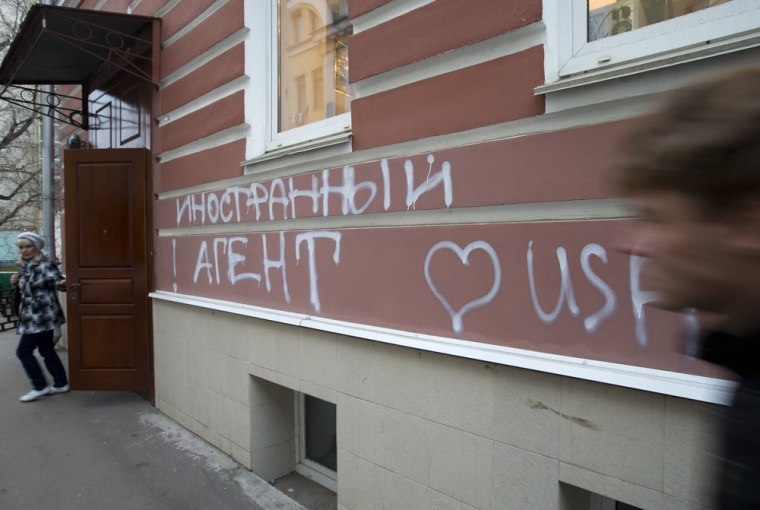Workers at the human rights organization Memorial arrived at work on Wednesday morning to see a phrase spray-painted across their office building: “FOREIGN AGENT.” Vandals scrawled the same words in giant, sloppy white letters across the door of For Human Rights, which represents citizens in disputes with the Russian police or prosecutors.
The phrase, which to Russians evokes treachery and cold war espionage, was repeated many times on Wednesday, when a new law came into force requiring nonprofit groups that receive financing from outside Russia to identify themselves as “foreign agents.”
The law was hurriedly passed two months after the inauguration of President Vladimir V. Putin, who has accused foreign governments of provoking the large anti-Kremlin demonstrations that began here last winter.
The law has been accompanied by other measures discouraging interaction with foreigners, like expanding the legal definition of treason to include “providing financial, technical, advisory or other assistance to a foreign state or international organization.”
'Foreign agent equals a traitor'
Many groups like Memorial and For Human Rights have decided to defy the new law, despite the threat of fines, a forced shutdown or, if prosecutors choose to pursue a criminal charge, a prison sentence of up to two years.
Oleg P. Orlov, Memorial’s chairman, said that accepting the “foreign agent” label would so undermine public trust that rights advocates would no longer be able to carry out work like monitoring prison conditions or researching disappearances in the restive North Caucasus.
“A foreign agent equals a traitor, a betrayer of the homeland,” he said. Groups that comply, he added, “will be outcasts in this society. They will be branded. The public will look at them with suspicion, and officials will simply refuse to associate with them. They will be outcasts.”
It is unclear how the Russian authorities will enforce the vaguely worded law, which will be overseen by the Justice Ministry.
The requirement applies only to organizations engaged in “political activities,” like trying to influence public opinion or advocating to change policy. Various groups say they are poised to contest any penalties through the court system, in part to test the constitutionality of the new law.
“We will risk a fine, and it’s possible that a question of a criminal charge will arise,” said Pavel Chikov, who heads a legal organization, Agora. “But if we are forced to choose between ceasing our work and risking a criminal investigation, I will choose the latter.”
Government officials spoke approvingly of the new law, saying foreign money must be excluded from politics in order to defend Russia’s sovereignty.
Western-financed programs proliferated during the 1990s, when Russia’s economy and political system were a shambles and foreign governments hoped to help guide the development of a post-Soviet state. Mr. Putin intends to uproot the vestiges of those projects, which he believes have undermined support for him in Russia.
A particular grievance is the United States-funded election monitoring group Golos, which documented and publicized voter fraud ahead of last year’s parliamentary elections, adding fuel to the burst of protest. In September, Russia announced the end of two decades of work by the United States Agency for International Development.
Veronika Krasheninnikova, the head of the Institute for Foreign Policy Research and Initiatives, in Moscow, said that she believed Washington had advised Russia’s nonprofit groups to defy the new law, forcing the Russian government to take harsh measures.
“Confrontation will be beneficial for these organizations,” she said, during a Wednesday round table on the new law.
She added: “We will be told, ‘Look how much you lose in the eyes of the world.’ If we are afraid of the West, it would be better to give up right now, to surrender, put on white ribbons and white flags and announce capitulation.”
Referring to the pro-American president of Georgia, she added, “All normal people know that if Washington praises you and holds you up as an example, it means that you have turned into a Saakashvili and betrayed your country.”
Among those poised for a prolonged standoff with the authorities is Lyudmila Alexeyeva, 85, a Soviet-era dissident who heads the Moscow Helsinki Group. Ms. Alexeyeva said she was ready to go to great lengths to avoid being affected by the law.
She said she will refuse any further foreign financing for the Helsinki Group and, if necessary, sell her collection of ceramic figurines to raise money and move the entire organization into her apartment.
“A law like this is just not going to work,” she said. “I am an old person. I was 25 years old when Stalin died, and I spent my childhood and youth in a totalitarian state.”
She added that Russia has changed greatly since then.
“Stalin, in order to create a totalitarian state, brought down an iron curtain around the country. And we’ve just joined the World Trade Organization,” she said. “So why did we join the World Trade Organization? How are we going to be able to fence ourselves off in a globalized world? No, Putin was born too late.”
This article, "As ‘Foreign Agent’ Law Takes Effect in Russia, Human Rights Groups Vow to Defy It," originally appeared in The New York Times.
